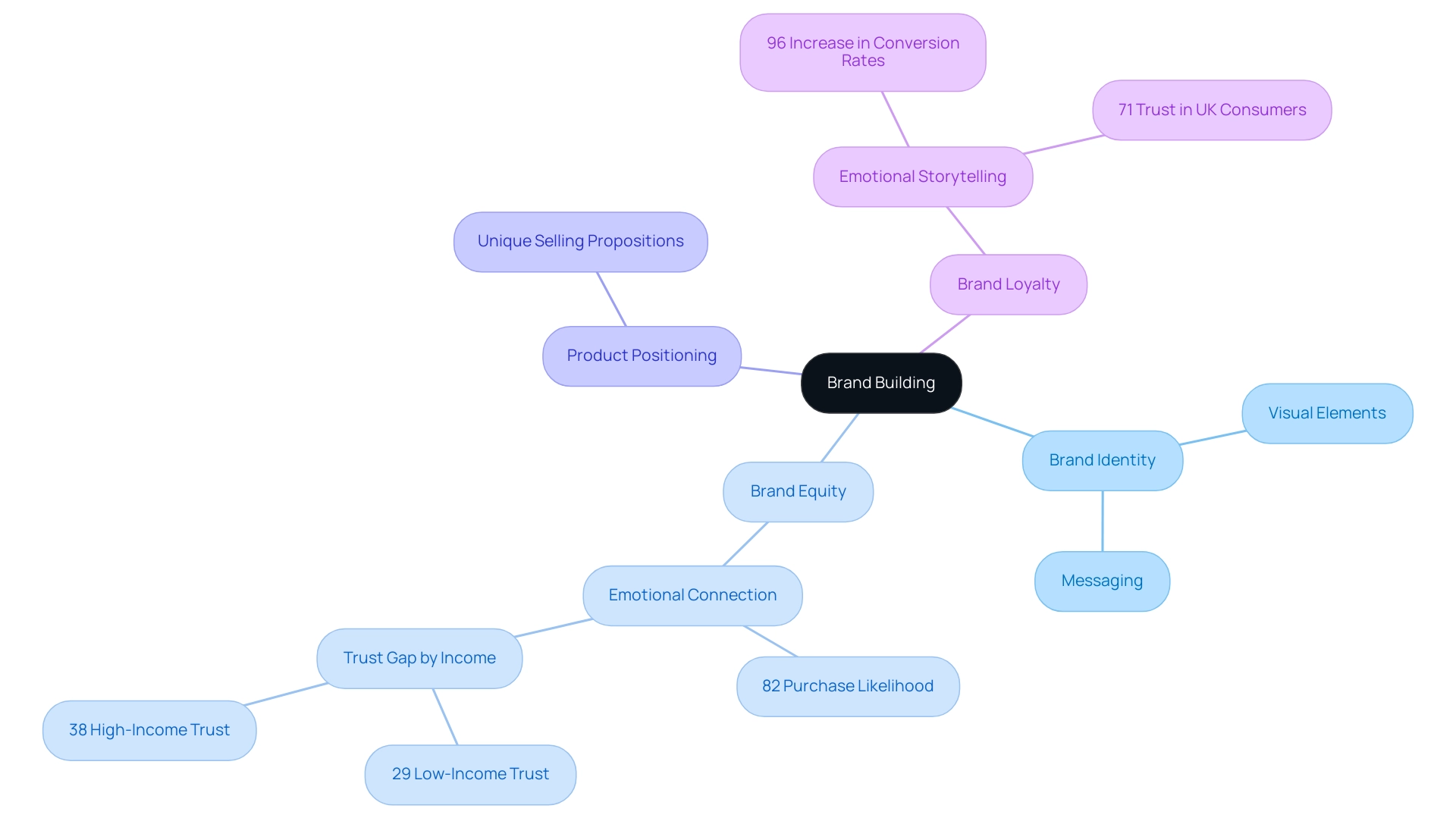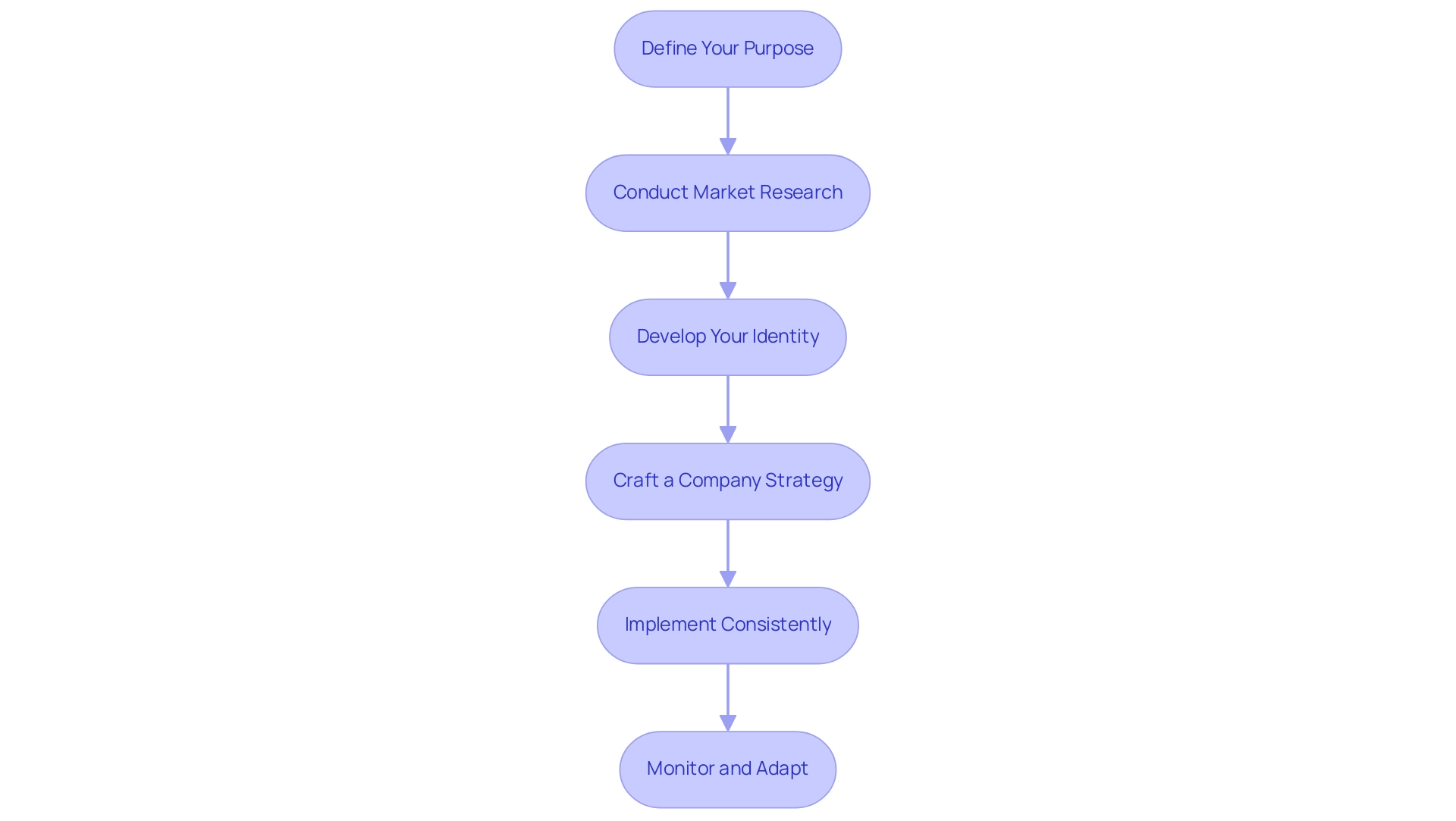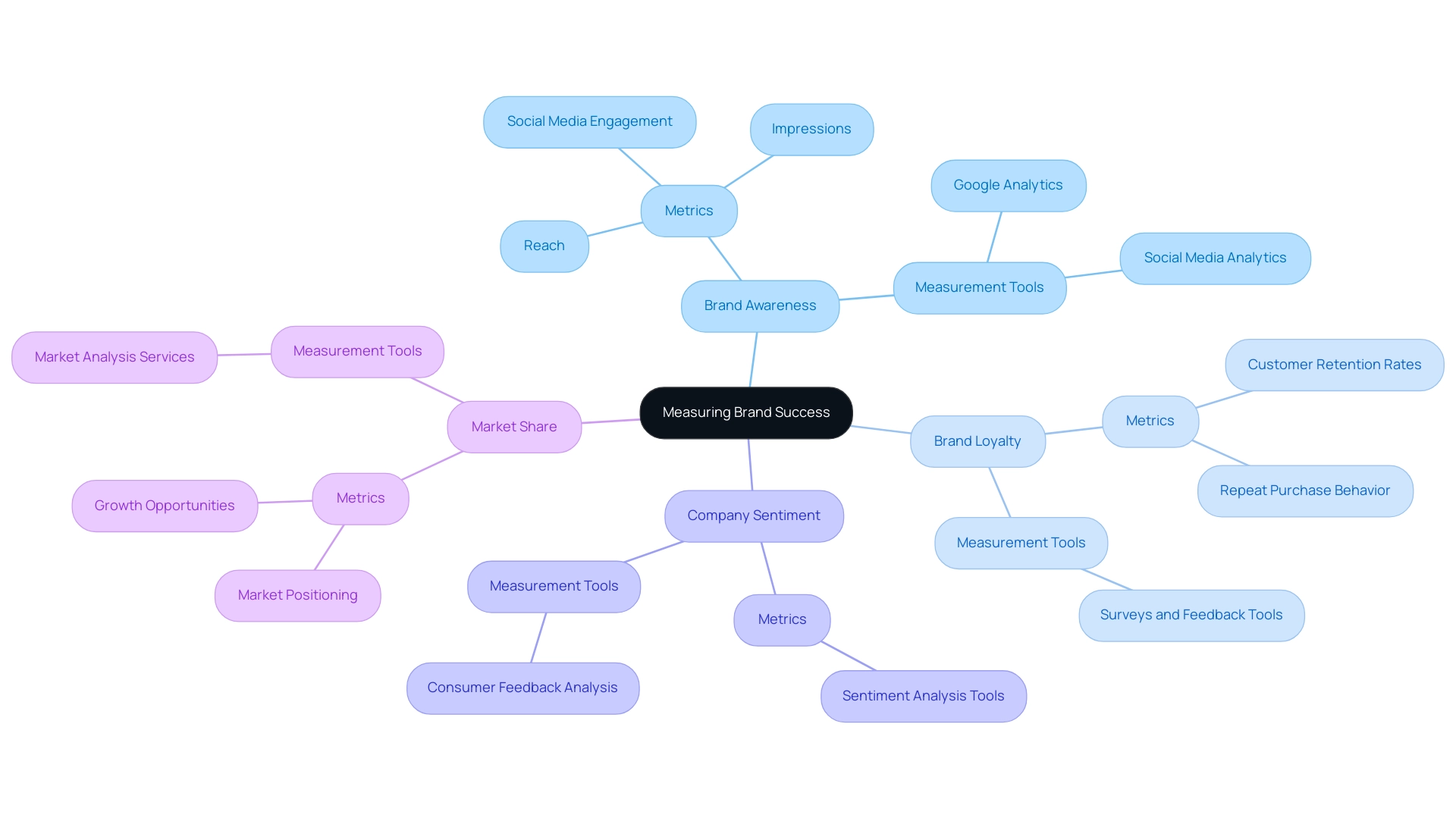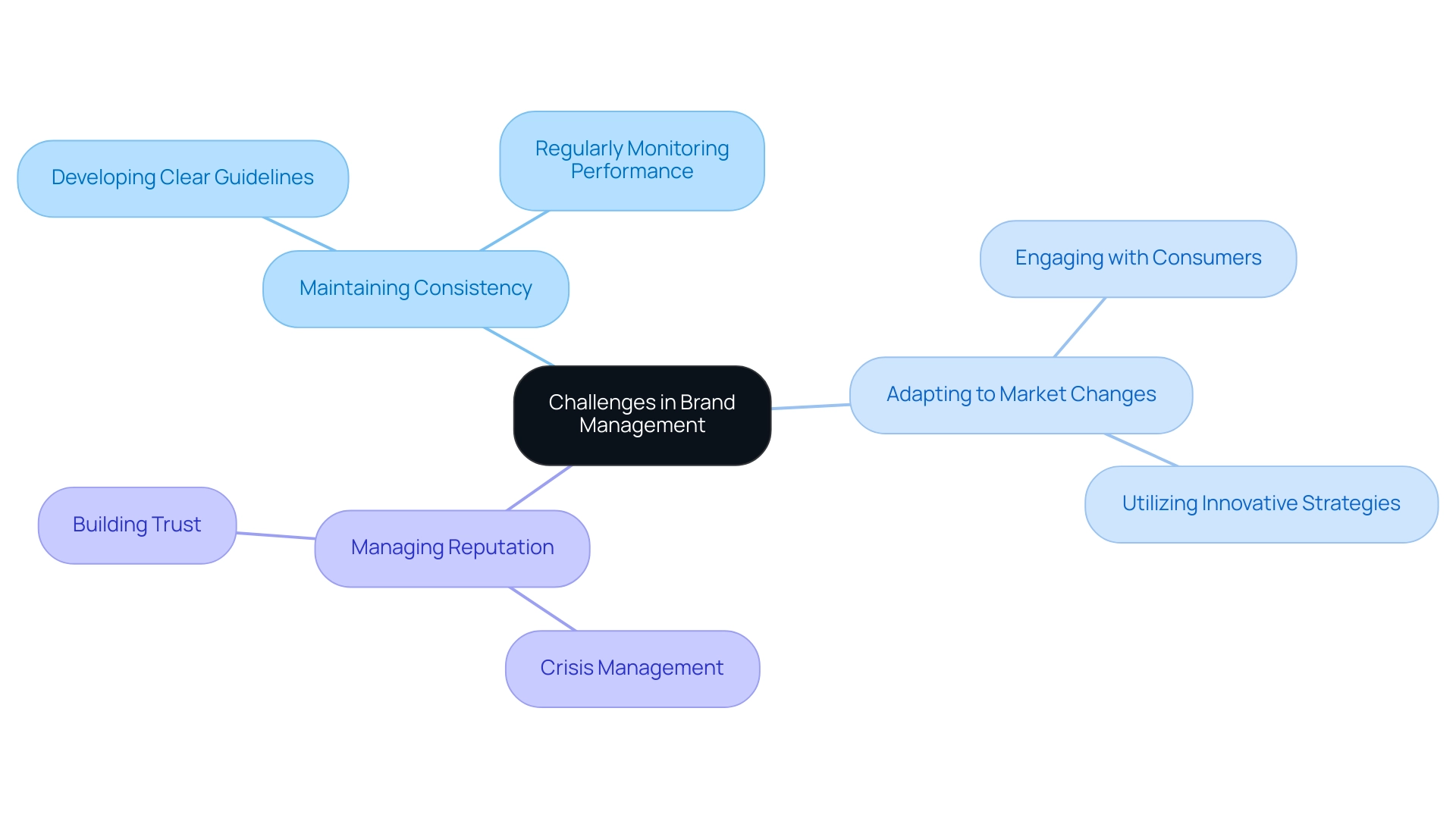Digital Branding Strategies
Proven Strategies for Success in Brand Build Support: Best Practices for Effective Brand Management
Overview
This article presents proven strategies for effective brand management, underscoring best practices that bolster brand-building efforts. It asserts the critical role of brand identity, emotional connections, and consistent messaging. Research supports the notion that robust branding not only fosters increased customer loyalty but also enhances market differentiation, ultimately driving business success.
Introduction
In a marketplace saturated with choices and messages, the significance of brand building has reached unprecedented heights. Establishing a robust brand identity transcends the mere creation of a logo or a catchy slogan; it involves crafting a narrative that resonates profoundly with the target audience. This article explores the essential components of brand building, investigating key concepts such as:
- Brand equity
- Loyalty
- Positioning
While also highlighting innovative strategies employed by companies like WonderEight. As market dynamics shift, comprehending how to effectively engage consumers through storytelling and digital marketing is imperative for businesses striving to distinguish themselves in a crowded landscape. By dissecting these elements, brand managers can formulate comprehensive strategies that cultivate emotional connections, foster loyalty, and ultimately pave the way for sustained success.
Understanding Brand Building: Key Concepts and Definitions
Building a name is a critical process that necessitates brand build support to create and establish its identity, values, and market presence. This multifaceted approach encompasses several key concepts, particularly as they relate to WonderEight’s innovative branding and digital marketing solutions:
- Brand Identity: This includes the visual and verbal elements that represent a brand, such as its name, logo, and messaging. A robust identity is crucial, as it creates the initial impression and emotional bond with customers. WonderEight assists companies in creating a unified identity that connects with their target audience to enhance brand build support.
- Brand Equity: This refers to the value a label adds to a product or service, shaped by customer perceptions and experiences. Research indicates that companies with high emotional connections see a significant impact on purchasing decisions, with 82% of customers more likely to buy from companies they feel emotionally connected to. Furthermore, statistics reveal that only 29% of low-income individuals have confidence in their products, compared to 38% of high-income individuals, highlighting a gap that companies must address to create equity across various demographics. WonderEight’s strategies aim to improve value by nurturing emotional ties with customers.
- Product Positioning: This approach involves placing a product in the minds of consumers relative to its competitors, emphasizing unique attributes and benefits. Effective positioning can lead to increased loyalty and market share. WonderEight specializes in crafting positioning strategies that highlight a company’s unique selling propositions.
- Brand Loyalty: This is the tendency of individuals to repeatedly buy the same label due to positive experiences and emotional connections. Notably, companies that effectively cultivate loyalty can experience a 96% rise in conversion rates through emotional storytelling, underscoring the significance of engaging with clients on a deeper level. As noted by Adobe, 71% of UK consumers demonstrate their trust in a company by making more purchases, emphasizing the critical role of trust in consumer loyalty. WonderEight underscores the importance of storytelling as a form of brand build support in fostering customer loyalty.
Grasping these concepts is essential for managers seeking to implement brand build support strategies that resonate with their target audience and distinguish their identity in a competitive environment. Recent trends in 2025 indicate that 62% of B2C clients are more inclined to interact with advertisements and social posts showcasing customer images, emphasizing the shift towards authenticity and relatability in communication.
Expert opinions highlight that a well-defined identity not only enhances recognition but also fosters trust and loyalty, essential components for long-term success in today’s market. The case study titled ‘The Power of Storytelling’ illustrates how emotional storytelling creates connections with consumers, leading to stronger loyalty and higher conversion rates, reinforcing the significance of emotional ties in management strategies. WonderEight’s approach to storytelling exemplifies how companies can effectively engage their audience and drive loyalty.

The Importance of Brand Building: Why It Matters for Businesses
Brand building is essential for businesses for several compelling reasons:
- Differentiation: In an oversaturated marketplace, a strong identity enables a business to distinguish itself from competitors. This differentiation not only aids in public recognition but also influences purchasing decisions, as 64% of individuals express trust in companies that focus on niche markets.
- Customer Loyalty: A well-crafted identity cultivates trust and emotional connections with consumers, which are vital for encouraging repeat purchases and customer advocacy. Powerful identities instill a sense of belonging, motivating customers to remain loyal even in the face of competitive offers. To foster this loyalty, companies can employ strategies such as personalized marketing and community engagement.
- Perceived Value: Established brands often command premium pricing due to their perceived quality and value. This perception enhances profitability, allowing businesses to leverage their brand equity effectively.
- Market Share: Strategic product development can significantly boost market share. Consumers are more inclined to gravitate towards familiar and trusted names, leading to sustained growth and a competitive advantage.
- Crisis Management: A robust identity is better equipped to navigate crises. Loyal customers are more likely to support a company during challenging times, providing a buffer against negative impacts.
The significance of building a reputation is underscored by the fact that successful employer promotion can lower new hire costs by up to 50%. This statistic illustrates how a strong identity not only attracts customers but also talent, further solidifying its market position.
As we approach 2025, the emphasis on establishing a reputation remains paramount. As David Mayer aptly states, “Marketers must change the frame of reference. Focusing on ‘differentiation’ only positions the conversation relative to competitors; instead, the focus needs to be on the customer, and how a company is meaningful to them.” This perspective reinforces the idea that successful marketing strategies should prioritize customer needs and preferences.
Moreover, integrating Design Thinking into marketing strategies can enhance the emotional resonance of designs, ensuring they meet human needs and preferences.
Case studies, including the extensive campaigns created by an agency for Miranda and Quaker Oats, illustrate the tangible benefits of building a reputation. These campaigns not only enhanced market presence but also demonstrated WonderEight’s capability to create tailored solutions that drive business results. By focusing on engaging content and meaningful experiences, businesses can achieve differentiation and foster customer loyalty, ultimately leading to increased profitability and market resilience.
Investing in identity development is not merely a tactical decision; it is a strategic imperative that can bolster brand support and yield significant long-term benefits for businesses.
Step-by-Step Guide to Building a Strong Brand
Creating a robust identity involves several crucial steps that can significantly impact customer perception and loyalty.
Define Your Purpose: Articulate the core reason for your organization’s existence. A clearly articulated purpose resonates with individuals; 2024 trends suggest that companies must embody human elements, personalities, and values to meet changing expectations. This alignment with customer values is crucial, as highlighted by Hubble’s observation that in the UK, trust in a label is reflected by increased purchasing behavior.
Conduct Market Research: Gain a deep understanding of your target audience, their needs, and preferences, alongside a thorough analysis of your competitors. Recent statistics indicate that only approximately one in three individuals trust most labels, highlighting the significance of customized market research to establish credibility across various demographics. For instance, trust levels vary significantly by income, with only 29% of low-earners having confidence in their products compared to 38% of high-income shoppers. This disparity underscores the need for companies to cultivate trust among all consumer segments.
Develop Your Identity: Create visual and verbal elements that encapsulate your personality. This includes crafting logos, choosing color palettes, and developing messaging that aligns with your purpose. A strong identity is essential for brand building support, fostering recognition and trust that are crucial in today’s competitive landscape. WonderEight provides innovative branding solutions that assist businesses in brand building support to develop a compelling identity customized to their unique market position.
Craft a Company Strategy: Outline a comprehensive plan for communicating your identity to your audience. This should encompass the choice of suitable marketing channels and tactics, ensuring that your approach is adaptable to the increasing trend of digital engagement. Notably, 65% of all digital ad spending is anticipated to go toward mobile advertising, emphasizing the necessity for companies to engage effectively in this space, especially as individuals are expected to spend over 100 minutes daily watching online videos. WonderEight’s digital marketing solutions can assist in optimizing your strategy for maximum impact.
Implement Consistently: Ensure that every interaction, from advertising to customer service, consistently reflects your identity and values. Consistency fosters trust and strengthens your message, which is crucial in a market where public trust can differ greatly by income level. WonderEight emphasizes the importance of consistent messaging across all platforms to brand building support for trust and loyalty among customers.
Monitor and Adapt: Regularly evaluate your company’s performance and collect consumer feedback to identify areas for improvement. This iterative process allows for timely adjustments that can enhance image perception and effectiveness. This company offers resources and analytics to assist organizations in tracking their performance and adjusting strategies as needed.
By adhering to these steps and utilizing its extensive branding and digital marketing solutions, managers can brand building support to develop a unified and powerful identity that connects profoundly with their audience, ultimately fostering engagement and loyalty.

Crafting Your Brand Identity: Elements and Strategies
Crafting a strong brand identity in 2025 necessitates a strategic approach that encompasses several essential elements, particularly those offered by WonderEight’s comprehensive branding and digital marketing solutions:
- Logo: A memorable logo serves as the visual cornerstone of your brand, significantly influencing consumer perception. Research indicates that investing in a professionally designed logo can enhance consumer confidence by 75%, making it crucial for maintaining relevance and resonance over time. A recent case study on logo design trends highlights that the human brain processes visuals 60,000 times quicker than text, underscoring the importance of a well-designed logo in effective branding.
- Color Palette: Colors play a pivotal role in evoking emotions and should align with your identity’s personality. Notably, a signature color can enhance recognition of a company by up to 80%. As mentioned by Exploding Topics, “A signature color increases the chances of consumers recognizing a company by 80%,” emphasizing the significance of careful color selection in marketing strategies.
- Typography: The selection of fonts expresses your company’s tone and style, contributing to the overall identity. Typography must remain consistent across all platforms to strengthen recognition.
- Voice and Tone: Establishing a consistent voice in your messaging is vital. This voice should reflect your values and resonate with your audience, fostering a deeper emotional connection.
- Imagery: Utilizing visuals that correspond with your identity is essential. Given that the human brain processes visuals 60,000 times quicker than text, impactful imagery becomes a key component of effective branding.
To effectively develop your brand identity, consider the following strategies:
- Conduct thorough audience research to understand preferences and expectations.
- Analyze competitors to identify gaps and opportunities that your company can exploit.
- Test various elements, such as logos and color palettes, to determine what resonates best with your audience.
- Incorporate digital engagement best practices, including continuous content optimization and A/B testing, to enhance your online presence.
A well-defined identity not only enhances recognition but also fosters emotional connections with consumers, ultimately driving loyalty and engagement. Successful case studies reveal that companies prioritizing these elements and brand-building support, like those backed by WonderEight, are better positioned to thrive in a competitive landscape. Furthermore, strong employer imaging can increase retention by up to 28%, significantly reducing new hire costs, which highlights the broader implications of a strong identity.
The Power of Storytelling in Brand Building
Storytelling is an essential element of building a reputation for several compelling reasons:
- Emotional Connection: Narratives resonate with consumers on an emotional level, making names more relatable and memorable. In fact, companies that effectively utilize emotional storytelling can experience a remarkable 96% increase in conversion rates. Customers with strong emotional ties to an organization demonstrate three times higher lifetime value, highlighting the significant impact of emotional connections on purchasing behavior.
- Product Differentiation: A well-crafted story can distinguish a product from its competitors by showcasing unique values and experiences. This differentiation is crucial in a crowded marketplace where buyers are bombarded with choices. Notably, just 30% of companies utilize their guidelines consistently, while 15% lack any guidelines, posing a threat to consistent images and narratives.
- Audience Engagement: Compelling stories encourage individuals to connect with the organization, whether via social platforms, content sharing, or recommendations. In the UK, 71% of individuals demonstrate trust in a label through heightened purchasing behavior, underscoring the significance of genuine storytelling in promoting engagement.
- Loyalty to Labels: When individuals resonate with a label’s narrative, they are more inclined to cultivate loyalty and support. Emotional marketing has been shown to have a significant positive impact on campaigns, with 83% of marketers acknowledging its effectiveness. This reinforces the idea that emotional storytelling is a powerful tool in marketing strategies.
To effectively leverage storytelling in identity building, consider the following strategies:
- Identify Your Core Message: Clearly define your entity’s core message and values to ensure consistency in your storytelling.
- Craft Resonant Narratives: Develop narratives that reflect these values and resonate with your target audience, creating a deeper emotional connection.
- Utilize Diverse Formats: Share your stories through various formats, such as videos, blogs, and social media posts, to reach a broader audience and enhance engagement.
By integrating storytelling into identity efforts, businesses can effectively build support and cultivate deeper connections with their audience, ultimately enhancing loyalty and driving success. The influence of narrative marketing fosters emotional ties with customers, resulting in enhanced loyalty and increased conversion rates.
Leveraging Digital Marketing for Effective Brand Management
Digital marketing is indispensable for effective identity management, playing a crucial role in brand build support by offering numerous advantages that significantly enhance a company’s visibility and audience interaction. Key benefits include:
- Enhancing Visibility: Online platforms afford brands the opportunity to reach a wider audience, amplifying exposure and awareness. Engaging customers through social media and content marketing is vital for brand build support, as it enables direct interaction, nurtures meaningful relationships, and fosters loyalty to the company.
- Data-Driven Insights: Digital marketing tools yield valuable insights into consumer behavior, allowing companies to brand build support by tailoring their strategies for maximum impact. As Derek Andersen noted, “94% of marketers claim AI tools have assisted them in increasing revenue over the past year,” underscoring the importance of leveraging technology in marketing strategies.
- Cost-Effective Marketing: In comparison to traditional marketing methods, digital marketing frequently provides brand build support by delivering a superior return on investment, rendering it a financially astute choice for businesses.
To effectively harness digital marketing for brand management, consider the following strategies:
- Develop a comprehensive digital strategy that incorporates social media, search engine optimization (SEO), and content marketing to establish a cohesive online presence.
- Utilize analytics tools to track performance metrics, enabling real-time adjustments to strategies based on consumer engagement and market trends.
- Engage your audience through interactive content and personalized messaging, which can significantly enhance visibility and cultivate deeper connections.
For example, WonderEight’s collaboration with Quaker Oats illustrates the power of a customized marketing strategy. By aligning with the organization’s objectives and target audience, the campaign showcased the significance of brand build support, resulting in a marked improvement in market presence and consumer interaction through a well-executed digital marketing approach.
As digital marketing continues to evolve, staying abreast of the latest trends is essential for companies aiming to brand build support to enhance conversions and maintain relevance in a competitive landscape. In 2022, search advertising in the UK alone generated £13.1 billion, reflecting a 13% increase from the previous year. This emphasizes the growing importance of digital channels in visibility and engagement, necessitating that companies brand build support by adapting their strategies accordingly.
By integrating these strategies into product management, businesses can not only elevate their presence but also foster meaningful consumer engagement.
Measuring Brand Success: Key Metrics and Tools
Measuring success necessitates a comprehensive approach centered on key performance metrics, which yield valuable insights into a company’s market effectiveness. The following metrics are essential for evaluating brand performance:
-
Brand Awareness: Metrics such as reach, impressions, and social media engagement serve as critical indicators of how well your brand is recognized among target audiences. Brands that leverage research insights to optimize their conversion funnels have reported conversion rate improvements of up to 35%. This underscores how strategic branding efforts, particularly brand build support, can significantly enhance customer engagement and visibility through customized marketing solutions.
-
Brand Loyalty: Customer retention rates and repeat purchase behavior are vital for understanding loyalty levels. Notably, 39% of individuals express a willingness to transition to brands that demonstrate greater transparency, highlighting the necessity for companies to cultivate trust and loyalty. The comprehensive campaign for Quaker Oats, crafted by WonderEight, exemplifies how tailored marketing solutions can foster enhanced engagement and loyalty, showcasing the effectiveness of WonderEight’s methodologies in providing brand build support and nurturing lasting client relationships.
-
Company Sentiment: Analyzing consumer feedback through sentiment analysis tools enables companies to gauge public perception effectively. This qualitative data can inform strategic adjustments that enhance reputation. The company employs advanced sentiment analysis tools to deliver actionable insights that refine branding strategies.
-
Market Share: Monitoring your company’s market share in relation to competitors offers a clear perspective on overall success and growth potential within the industry. WonderEight’s market analysis services empower companies to understand their positioning and identify growth opportunities.
To effectively measure these metrics, brand managers can utilize various tools:
-
Google Analytics: This platform is invaluable for tracking website traffic and user behavior, providing insights into how visitors interact with your brand online.
-
Social Media Analytics: Tools such as Facebook Insights and Twitter Analytics yield data on engagement and reach, allowing companies to assess their social media impact.
-
Surveys and Feedback Tools: Platforms like SurveyMonkey facilitate the collection of consumer insights and perceptions, enabling companies to better understand their audience.
Regularly measuring these metrics empowers managers to evaluate the effectiveness of their strategies and brand build support, leading to informed, data-driven decisions that enhance performance. As Ben Franklin wisely noted, ‘It takes many good deeds to build a reputation, and only one bad one to lose it,’ emphasizing the importance of maintaining a positive public image. Successful case studies, such as the comprehensive campaign for Quaker Oats, illustrate how tailored marketing solutions from WonderEight can drive increased consumer engagement and loyalty.
By concentrating on these key metrics, companies can adeptly navigate the complexities of the market and establish a formidable, lasting presence.

Overcoming Challenges in Brand Management: Strategies for Success
Branding managers face a myriad of challenges that can impede effective management, including:
- Maintaining Consistency: Achieving a cohesive message across multiple channels is a complex undertaking. Inconsistent communication can confuse clients and diminish identity recognition. Research shows that 82% of customers are more likely to purchase from a company with which they have a strong emotional connection, highlighting the critical nature of consistency. WonderEight offers tailored branding solutions that help maintain a uniform message across all platforms.
- Adapting to Market Changes: The swift evolution of customer preferences and market dynamics necessitates a flexible approach to branding. Brands must be poised to pivot swiftly in response to emerging trends. WonderEight’s innovative digital marketing strategies equip managers with the tools necessary to stay ahead of market shifts.
- Managing Reputation: Negative feedback or crises can profoundly impact public perception. Effective reputation management is essential for mitigating damage and restoring trust. Elements such as color, logos, and voice significantly influence consumer perceptions and awareness. WonderEight provides comprehensive reputation management services to assist companies in navigating these challenges adeptly.
To address these challenges effectively, managers can implement several strategies:
- Developing Clear Guidelines: Establishing thorough guidelines is vital for ensuring consistency in messaging and visual identity. This framework serves as a reference for all marketing efforts, helping to maintain a cohesive presence. A distinctive hue, for instance, can increase the likelihood of individuals recognizing a company by 80%. WonderEight aids in creating these guidelines to bolster recognition.
- Regularly Monitoring Performance: Employing analytics tools to track health and consumer sentiment is crucial. This data-driven approach enables managers to identify potential issues early and adjust strategies accordingly. Notably, 96% of marketing decision-makers find content marketing effective for enhancing visibility, which can be pivotal in this process. WonderEight offers advanced analytics solutions to support businesses in evaluating their performance effectively.
- Engaging with Consumers: Establishing open lines of communication with the audience fosters trust and loyalty. Actively seeking client feedback and addressing concerns can enhance reputation and strengthen relationships. The organization emphasizes engagement strategies that facilitate meaningful interactions.
Successful examples, such as the extensive campaign for Quaker Oats, demonstrate how creative marketing techniques can lead to increased customer involvement and recognition. This campaign resulted in heightened visibility and consumer interaction, showcasing the efficacy of WonderEight’s strategies. By proactively addressing these challenges, brand managers can significantly enhance their effectiveness and provide substantial support for successful brand management.

Conclusion
Establishing a strong brand in today’s competitive marketplace is not merely advantageous; it is essential for long-term success. The journey of brand building encompasses several critical components: brand identity, equity, positioning, and loyalty. Each of these elements plays a pivotal role in crafting a brand narrative that resonates with consumers on an emotional level, fostering trust and encouraging repeat purchases.
Through innovative strategies and tailored solutions, companies like WonderEight exemplify the power of effective brand management. By focusing on emotional storytelling and consumer engagement, brands can differentiate themselves, enhance perceived value, and cultivate a loyal customer base. Moreover, the integration of digital marketing practices amplifies brand visibility and allows for more meaningful interactions with target audiences.
As the landscape continues to evolve, brand managers must remain agile, adapting to market changes and consumer preferences while maintaining consistency across all touchpoints. The insights and strategies outlined underscore the importance of a comprehensive approach to brand management—one that prioritizes emotional connections and authentic engagement. Ultimately, investing in brand building is not just a strategic imperative; it elevates market presence and drives sustainable growth and profitability in a crowded marketplace.
Frequently Asked Questions
What is brand building, and why is it important?
Brand building is the process of creating and establishing a brand’s identity, values, and market presence. It is important because it helps differentiate a business in an oversaturated market, fosters customer loyalty, enhances perceived value, increases market share, and aids in crisis management.
What are the key components of brand building?
The key components of brand building include brand identity, brand equity, product positioning, and brand loyalty. These elements work together to create a strong brand that resonates with consumers.
How does WonderEight assist in brand building?
WonderEight provides innovative branding and digital marketing solutions that help companies create a unified brand identity, improve brand equity by nurturing emotional ties with customers, craft effective product positioning strategies, and foster brand loyalty through emotional storytelling.
What is brand identity, and why is it crucial?
Brand identity encompasses the visual and verbal elements that represent a brand, such as its name, logo, and messaging. It is crucial because it creates the initial impression and emotional bond with customers, influencing their perceptions and purchasing decisions.
What is brand equity, and how does it affect purchasing decisions?
Brand equity refers to the value a brand adds to a product or service, shaped by customer perceptions and experiences. Companies with high emotional connections see a significant impact on purchasing decisions, as many customers are more likely to buy from brands they feel emotionally connected to.
What role does product positioning play in brand building?
Product positioning involves placing a product in the minds of consumers relative to its competitors, emphasizing its unique attributes and benefits. Effective positioning can lead to increased customer loyalty and market share.
How does brand loyalty contribute to a company’s success?
Brand loyalty is the tendency of consumers to repeatedly buy the same brand due to positive experiences and emotional connections. Companies that cultivate loyalty can experience significantly higher conversion rates and increased customer advocacy.
What recent trends are influencing brand building strategies?
Recent trends indicate that consumers are more inclined to engage with advertisements and social media posts that showcase customer images, highlighting the shift towards authenticity and relatability in communication.
How can a strong brand identity aid in crisis management?
A robust brand identity can help a company navigate crises more effectively, as loyal customers are more likely to support the brand during challenging times, providing a buffer against negative impacts.
What is the significance of emotional storytelling in brand building?
Emotional storytelling creates connections with consumers, leading to stronger loyalty and higher conversion rates. It helps brands engage with their audience on a deeper level, making it a critical component of effective brand building strategies.



